
Illustration: Lee Wolf
Ask The Professor
Why don’t all birds fly south for the winter? And how do the ones that winter over in the frigid north survive?
This month’s faculty expert, J. Michael Reed, professor of biology, responds:
Whether or not a bird flies south for the winter depends a lot on what food the species eats. During our winters, many food sources, such as flying insects and nectar, are not available. Species that depend on these food sources must fly south to survive. Species that eat certain types of seeds, or that probe for insects and spiders under tree bark, can often find enough food to spend the winter here.
Amazingly, if a bird can get enough food, it apparently can survive even the worst weather in New England—this is true even for small birds such as chickadees. Feathers make excellent insulation, as anyone who owns a down coat knows, and birds convert food to body heat.
Some of the bird species that winter over in New England, such as cardinals, have done so only in recent decades. If you look at a bird species list for Massachusetts from the 1920s, you will see cardinals listed as uncommon visitors, and mockingbirds are present in winter only along the coast.
These species seem to have reacted to changes in the environment caused by humans. For cardinals, this might include the widespread presence of bird feeders, providing food in winter and allowing cardinals to expand their range into New England and become year-round residents. Mockingbirds also have expanded their range, partly because of human alteration of the landscape. Mockingbirds rely on berries in the winter, and plants that provide them have become more abundant, including some exotic invasive species.
Do you have a question for “Ask the Professor”? Email it to taylor.mcneil@tufts.edu.



